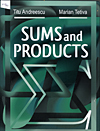- About MAA
- Membership
- MAA Publications
- Periodicals
- Blogs
- MAA Book Series
- MAA Press (an imprint of the AMS)
- MAA Notes
- MAA Reviews
- Mathematical Communication
- Information for Libraries
- Author Resources
- Advertise with MAA
- Meetings
- Competitions
- Programs
- Communities
- MAA Sections
- SIGMAA
- MAA Connect
- Students
- MAA Awards
- Awards Booklets
- Writing Awards
- Teaching Awards
- Service Awards
- Research Awards
- Lecture Awards
- Putnam Competition Individual and Team Winners
- D. E. Shaw Group AMC 8 Awards & Certificates
- Maryam Mirzakhani AMC 10 A Awards & Certificates
- Two Sigma AMC 10 B Awards & Certificates
- Jane Street AMC 12 A Awards & Certificates
- Akamai AMC 12 B Awards & Certificates
- High School Teachers
- News
You are here
Sums and Products

Publisher:
XYZ Press
Publication Date:
2018
Number of Pages:
338
Format:
Hardcover
Price:
59.95
ISBN:
9780999342817
Category:
Problem Book
[Reviewed by , on ]
Jeff Ibbotson
09/18/2018
This is a very nice problem book for budding mathematicians and mathematical contest aficionados. The book begins with an overview of the ways in which sums and sequences appear in solving a variety of types of problems. A question about how many games must be played to determine a winner in a chess tournament leads to a conversation about geometric series and iterations of floor functions followed by connections between binomial expansions, the sums for power sums, Gauss and telescoping series. And this is just the first chapter! All of this is fairly traditional but expressed so a beginner in the enterprise can easily grasp the techniques with ease.
The same pattern is followed for each chapter but with progressively less text. And then we are treated to solved problems both difficult and easy. Did I say “difficult”? Holy smokes! Many are from the IMO Longlist as well as other renowned sources (including Ramanujan). I must confess to a particular weakness for sums and products involving trigonometric identities such as \[ 4\sin\left(\frac{2\pi}{7}\right) - \tan\left(\frac{\pi}{7}\right) = \sqrt{7}.\] The solution (spoilers ahead!) involves some crafty algebra work involving factoring sixth degree polynomials! The exercise sent me off on an exploration of expansions of \(\tan(nx)\) in terms of \(\tan(x)\), which involves a surprise appearance of the binomial coefficients in an unusual way. Many other interesting examples follow this in the chapter “Telescoping Sums and Products in Trigonometry” and led me to think about the possible value of these to an “old school” theory of equations. Marvelous stuff.
There is much more in this book — the Abel Summation Formula (really summation-by-parts) and its use combined with classical inequality stuff, Combinatorial Identities and Generating Functions and a delightful chapter on Number Theory which introduces (and utilizes) the various multiplicative functions of analytic number theory. No prior experience is needed here — the Möbius inversion formula is proven here, for instance.
The book can be read and utilized with or without any background in Calculus (although this may help in a few places where Taylor series of basic transcendental functions appear). Solutions to the all the problems (categorized as “Easy”, “Medium” and “Hard”) appear later in the book. This is obviously an excellent training manual in learning to work with sums and products. Even casual readers like myself can learn much from it.
Jeff Ibbotson holds the Smith Teaching Chair in Mathematics at Phillips Exeter Academy.
See the table of contents in pdf format.
- Log in to post comments




